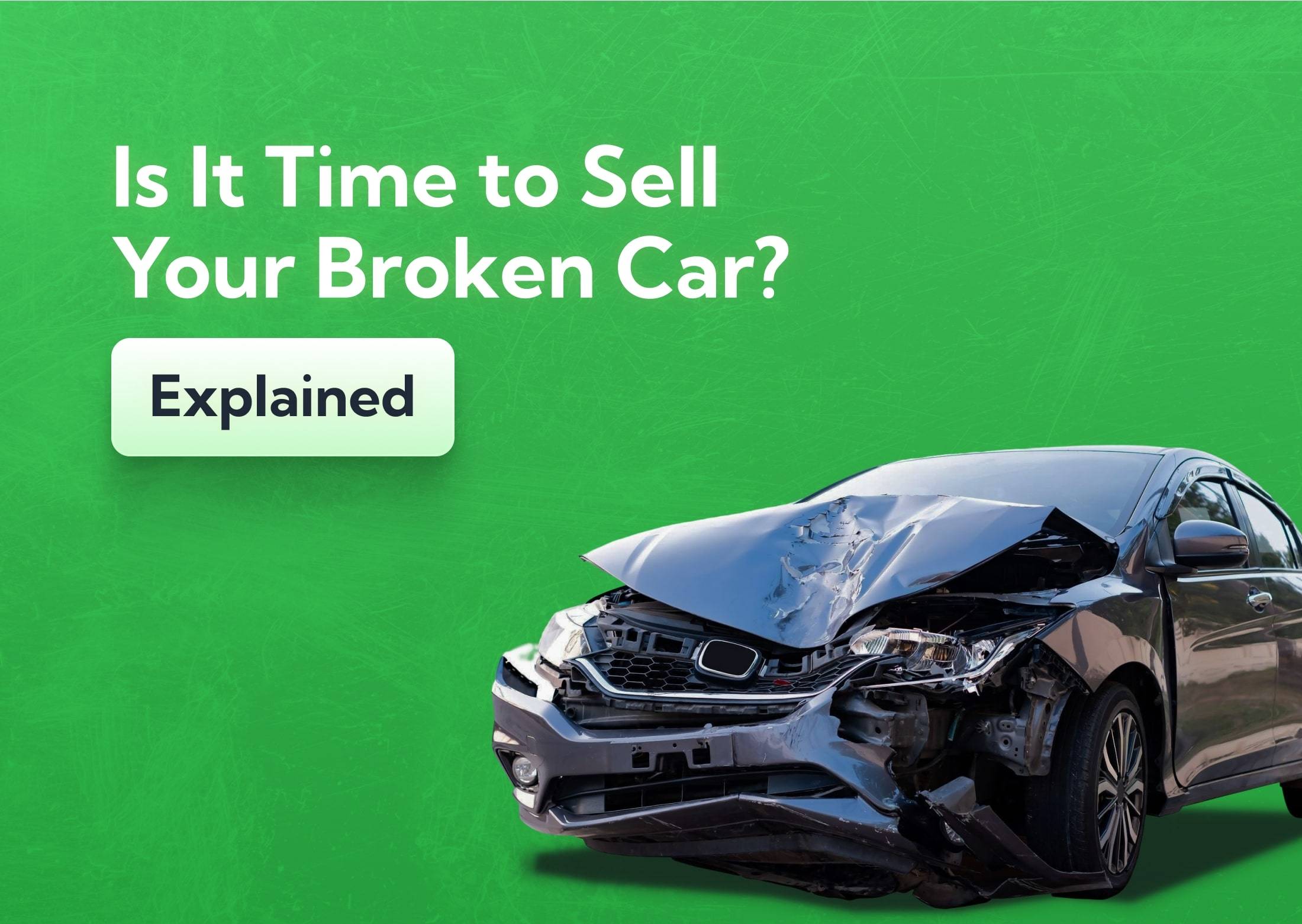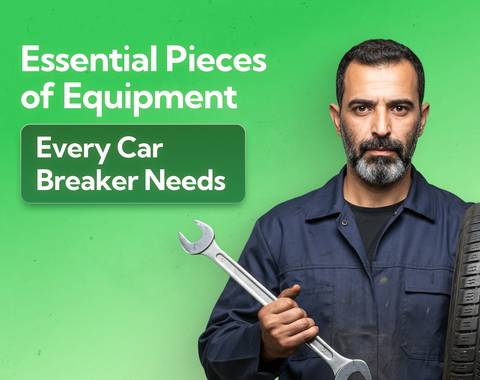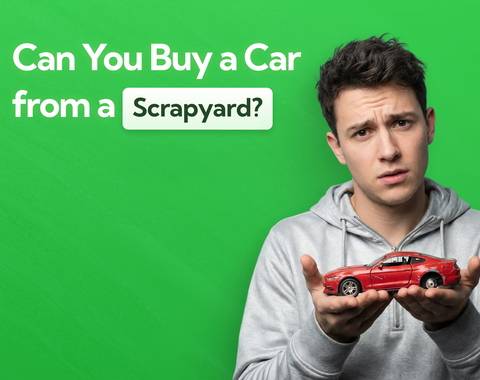Is It Time to Sell Your Broken Car? Explained
Got a broken car and not sure if it’s worth fixing? In this guide, we explain when to repair, when to sell, and the best ways to get value in the UK. From scrapping to private sales, here’s how to make the right call and avoid costly mistakes.
Last updated: 17th January, 2026

Award-winning CEO driving growth and social impact across automotive, recycling, and technology-led enterprise platforms.

Listen to this story
Maybe it’s taking up space on your drive, draining your wallet in repairs, or sitting unused while you pay insurance and taxes. Point is, a broken car can quickly go from a minor inconvenience to a costly burden.
At some point, you have to decide: is it worth fixing, or is it time to move on or even scrap my car?
In this guide, we’ll walk you through the signs it’s time to sell, the options available in the UK, and what you can expect from each.
What's in this article
- 1. Should you hold on or let go? First, get the big picture.
- 2. Common reasons Brits decide to sell a broken car
- 3. Fix it or sell it? How to make the right call
Should you hold on or let go? First, get the big picture.
Broadly speaking, you should keep a broken car only if repairing it will cost less than replacing it and the fix will give you several more years of safe, reliable use. If repairs are expensive, recurring, or the car no longer meets your needs, selling is usually the smarter move.
There are other factors, like sentimental value, that come into play when making the final decision. But from a practical standpoint, the numbers rarely lie. If the cost to keep the car on the road outweighs its remaining value or usefulness, it’s time to let go.
Common reasons Brits decide to sell a broken car
Brits normally decide to sell a broken car because of financial or practical reasons. Some can no longer justify the cost of keeping it roadworthy, while others simply want to avoid the stress and wasted time that comes with repeated issues.
Whatever the trigger, these are the most common situations that lead to the decision:
It’s become a money pit with constant repairs.
As a car gets older, two things happen simultaneously:
- The car goes down in value.
- Its repair needs and their associated costs increase dramatically.
When repair bills start adding up faster than the car’s value, the numbers stop making sense. If you’re back at the garage every few months, it’s a sign that the vehicle’s on its way out.
You’ve failed your MOT and don’t want the hassle.
Some MOT failures are quick fixes. But if you’ve got a dangerous defect or a major vehicle component that needs repair, it’s an expensive wake-up call. When the work needed to pass is too costly (or you simply can’t be bothered with the back-and-forth, selling is the cleaner, quicker route.
Your insurance won’t cover another breakdown.
If you’ve already claimed for a major fault or the car was written-off, your insurer might exclude similar repairs in the future or increase your premium. For some, that’s the tipping point to get rid of the car altogether because it means finding a new insurer (probably at a higher rate).
It’s taking up space and collecting dust.
A non-running car is a tremendous headache if you have limited parking. On-street spaces in particular are at a premium, and a vehicle you’re not using could be put to better use as cash in your account.
You’re switching to electric or a greener option.
The UK is pushing hard towards cleaner transport, with petrol and diesel car sales set to end by 2030. Low Emission Zones in cities like London, Birmingham and Glasgow already penalise high-polluting vehicles. For some drivers, selling a broken car is the perfect excuse to make the switch before future restrictions bite.
Fix it or sell it? How to make the right call
Do a quick cost-benefit analysis (without needing a spreadsheet).
You don’t need complicated maths. Ask yourself: how much will the repair cost, and how long will the fix realistically keep the car running?
Compare that to the cost of buying a safe, reliable replacement. If repairs will give you only a short reprieve, selling may save you money in the long run.
When a repair quote should be a deal-breaker
We always go by the “50% Rule”.
A repair bill that’s more than half your car’s market value is often a red flag, especially if the car is older or has other known issues. Major jobs like engine or gearbox replacements rarely pay off unless the vehicle is rare, valuable, or in otherwise excellent condition.
How to check your car’s current value, even if it’s not running
You can still get an accurate figure by using online valuation tools like our free valuation checker. We’ll tell you instantly how much your car’s worth to local scrap buyers and breaker’s yards who deal in damaged and non-running vehicles.
What mechanics don’t always tell you when it’s time to move on
Some garages will happily keep taking your money for repairs, even when the car is on its last legs. They’ll focus on fixing the immediate fault, but won’t necessarily warn you about other costly problems on the horizon.
The reason is simple: they’re in the business of repairing cars. They’re just happy you keep paying them. A trustworthy garage will ask you why you keep sinking money into one that keeps breaking, but they’re in no way obliged to.
That’s why you need to be on top of your repair costs and vehicle condition. Always get a second opinion.
What the experts say

Anthony Sharkey
How much can you get for a broken car in the UK?
Factors that affect the value
A broken car’s worth depends on its age, make, model, mileage and the type of damage. Popular brands and newer models in good cosmetic condition can still fetch decent money, even if they don’t run.
The scrap metal market also plays a part. If you have any of the following…
- A catalytic converter
- Alloy wheels in good condition
- A diesel particulate filter (DPF)
- Large quantities of aluminium parts
- An engine or gearbox that still works
Then you can get more than just your car’s scrap value if you sell these components separately or to a specialist breaker before sending the rest of the vehicle to an Authorised Treatment Facility (ATF).
Difference between scrap value and salvage value
Scrap value is based on the car’s weight and the current price of metal. This is usually the lowest payout option. Salvage value, on the other hand, is what a buyer might pay if they can repair or reuse major components. A car with a failed clutch but a perfect body can be worth more as salvage than scrap.
When selling for parts could make you more money
If you have the time, space, and tools, breaking a car for parts brings in more than scrapping it outright. High-demand items like alloy wheels, engines, gearboxes and electronics sell quickly on platforms like eBay or Facebook Marketplace. Sometimes, their individual resale value is as high as the scrap value would have been.
Just be aware that dismantling a car and disposing of what’s left comes with legal responsibilities in the UK.
You’ll need to keep proper records of the sale of parts, especially for items like catalytic converters, which are regulated due to theft concerns. Any vehicle shell that’s disposed of must go to an Authorised Treatment Facility (ATF) - it’s illegal to just dump or scrap it elsewhere. And you’ll be responsible for re-registering the car with the DVLA.
Best ways to sell a broken car in the UK (2026)
If you’re going to sell a broken car in the UK, you have four main options: instant sale to a car removal or scrap service, listing it online yourself, selling to a local garage or used car dealer, or donating it for a tax break or goodwill.
Let’s take a look at each option and see which one is best-suited to your car.
Quick sale to a car removal or scrap service
If you want the fastest, simplest way to get rid of a broken car, selling to a car removal or scrap service is impossible to beat.
We’ll collect your vehicle for free, then pay you on the spot based on its scrap or salvage value. We can almost always arrange same-day or next-day pickup, with payment made by secure bank transfer once the car is collected.
The key is to choose a licensed Authorised Treatment Facility (ATF) or a service that works directly with one (like ours). This ensures your car is disposed of legally, you get the correct paperwork (a Certificate of Destruction, and you avoid future liability if the vehicle is still on record as yours.
Selling to a car removal or scrap service is best if:
- Your car is beyond economical repair.
- You don’t want to deal with private buyers or negotiations.
- You need the space back quickly.
Listing it online: Gumtree, Facebook or specialised sites
If your car still has resale potential, even in a non-running state, listing it online can bring in more money than scrapping.
Platforms like Gumtree and Facebook Marketplace give you free, local reach while specialised sites like eBay Motors, Autotrader and Copart cater to buyers actively looking for repair projects or parts donors.
Be honest in your advert about the condition, faults, and whether the car runs. Include clear photos, mention any valuable components (like alloys or a working engine) and set a realistic price to avoid wasting time with lowball offers.
Listing your car online is best if:
- You’re happy to handle messages, viewings and negotiations.
- You have time to wait for the right buyer.
- The car’s model is in demand for parts or restoration.
Selling to a local garage or used car dealer
Garages and used car dealers will buy broken vehicles if they specialise in repairs, salvage or part resale. The process is usually quick; you’ll get an offer after a brief inspection and most will arrange collection if the car can’t be driven.
The downside is that trade buyers will factor in their profit margin, so you’re unlikely to get as much as you might from a private sale. The flip side to this is that the speed and lack of hassle can make up for the lower payout.
Selling to a local garage or used car dealer is best if:
- You want a straightforward, stress-free sale.
- You’re not chasing top price.
- You’d prefer to deal face-to-face with a local business.
Donating it for a tax break or goodwill
If money isn’t your main priority, donating your broken car can be a way to support a cause you care about.
In the UK, registered charities like Giveacar and Charity Car will collect your vehicle for free, then sell it for scrap or salvage to raise funds. You can choose the charity that benefits, and in some cases, you may be able to claim a small tax deduction if you’re a higher-rate taxpayer and the donation is processed through Gift Aid.
While you won’t get cash in your pocket, you’ll clear the vehicle from your drive, help the environment through proper recycling and make a positive impact at the same time. Plus, you can write it off on your taxes.
Donating your car for a tax break or goodwill is best if:
- You don’t care about the sale money.
- You want to support a specific charity or cause.
- You value convenience and a no-hassle handover.
Things to avoid: scams, low-ballers, and dodgy buyers
When you’re selling a damaged car, not every buyer has good intentions. Especially if you don’t go through a buying service like ours, you could easily fall into a scam. Knowing the common pitfalls will help you protect your time, money, and personal details.
- Scams: Watch for buyers who offer to overpay and then ask you to refund the difference, or those who request personal or banking details before committing. Always use secure payment methods and never release the car until funds have cleared.
- Low-ballers: Some buyers will make insultingly low offers in the hope you’re desperate to sell. Combat this by knowing your car’s value beforehand and setting a firm minimum price.
- Dodgy buyers: Avoid anyone unwilling to provide ID, complete the DVLA paperwork, or meet at a safe, public location. If they suggest skipping legal steps or paying in cash without a receipt, walk away.
What paperwork do you need to sell a broken car?
At the bare minimum, you’ll need your V5C logbook to prove you’re the registered keeper. Scrap yards, dealers, and charity collection services will also require proof of ID and proof of address under UK regulations.
If you’re selling privately, it helps to have:
- MOT certificates (even if expired, to show history)
- Service history and repair records
- A simple bill of sale stating the car’s condition, sale price and both parties’ details
Then, you’ll either de-register the vehicle using the V5C/2 (if you’re selling to an individual) or the V5C/3 (if you’re selling to a motor trader). You’ll use the respective online service to tell the DVLA you’ve sold/scrapped the vehicle, or notify them by post.
Note: At Car.co.uk, we handle the de-registration process for you. You’ll get the Certificate of Destruction and have your liability removed in a process that’s completely hands-off for you.
Tips to get the most money for your broken car
No matter if your car isn’t roadworthy, a few smart moves will help you squeeze more cash out of the sale. Presentation, transparency and a bit of legwork make a bigger difference than you think, even if you’re selling it to a scrap buyer.
Clean it up; even a quick wash can boost the sale price.
A clean car photographs better and makes a stronger first impression, even for scrap or salvage buyers. Spending half an hour with a bucket and sponge (and vacuum for the inside) will make your listing stand out from the others that look completely neglected.
Be honest, but highlight the remaining value.
Don’t hide faults because it’s illegal and will backfire, but do point out the positives. Alloy wheels, a solid body, working electronics or a recently replaced clutch all justify a higher asking price. Plus, they’re keywords the right buyer will actively search for, so you’ll spend less time dealing with time wasters.
Get multiple quotes before choosing a buyer.
Offers sometimes vary significantly between buyers, so compare offers from at least three sources. Include local scrap yards, online car buying services, and specialist salvage dealers to see who values your vehicle the most.
With our online car buying service, you’ll be able to compare multiple offers from local scrap buyers and breaker’s yards, then pick the one with the most favourable price.
Know your legal rights, and theirs.
When you sell a broken car in the UK, you’re entitled to a fair, transparent deal and proper DVLA paperwork, like a Certificate of Destruction if the car’s scrapped. Buyers have the right to inspect the vehicle, verify ownership and get a full and accurate disclosure before completing the purchase.
You have the right to refuse a sale before finalising paperwork, even if a buyer has inspected the car. But you must legally inform every potential buyer of any known faults if asked directly (Consumer Protection from Unfair Trading Regulations 2008).
What happens to your broken car after you sell it?
What happens depends on whether you’ve sold it to a buyer who plans to use it or to a scrap yard.
If you’ve sold to a buyer who plans to use or repair it, the car may be fixed and put back on the road, stripped for parts or exported to a market where repair costs are cheaper. Once the DVLA has been notified, you’re no longer responsible for the vehicle. What happens after is up to the new owner.
If you’ve sold to a scrap yard or Authorised Treatment Facility (ATF), the car will be depolluted (all fluids safely removed), dismantled for valuable parts and then crushed for its metal. You’ll receive a Certificate of Destruction confirming it’s been legally scrapped and you’re no longer the registered keeper.
Either way, the key point is that ownership and all responsibility ends the moment the DVLA records are updated officially, so always complete that step promptly
Final thoughts
Deciding whether to fix or sell a broken car comes down to a mix of cost, practicality, and timing. If repairs are affordable and buy you years of reliable use, keeping it makes sense. But when costs spiral or the car no longer fits your needs, selling is the better call.
From quick scrap collections to private sales and even charitable donations, the UK offers plenty of routes to move a broken car on. The right choice depends on how fast you want it gone, how much effort you’re willing to put forth and whether maximising value or convenience matters more to you.
Whichever route you take, know your car’s worth, handle the paperwork properly and take the precautions to protect yourself from sketchy buyers. That way, you can turn a problem on your driveway into cash in your account and a clean slate for your next set of wheels.
About Car.co.uk

Share on
Latest news & blogs










